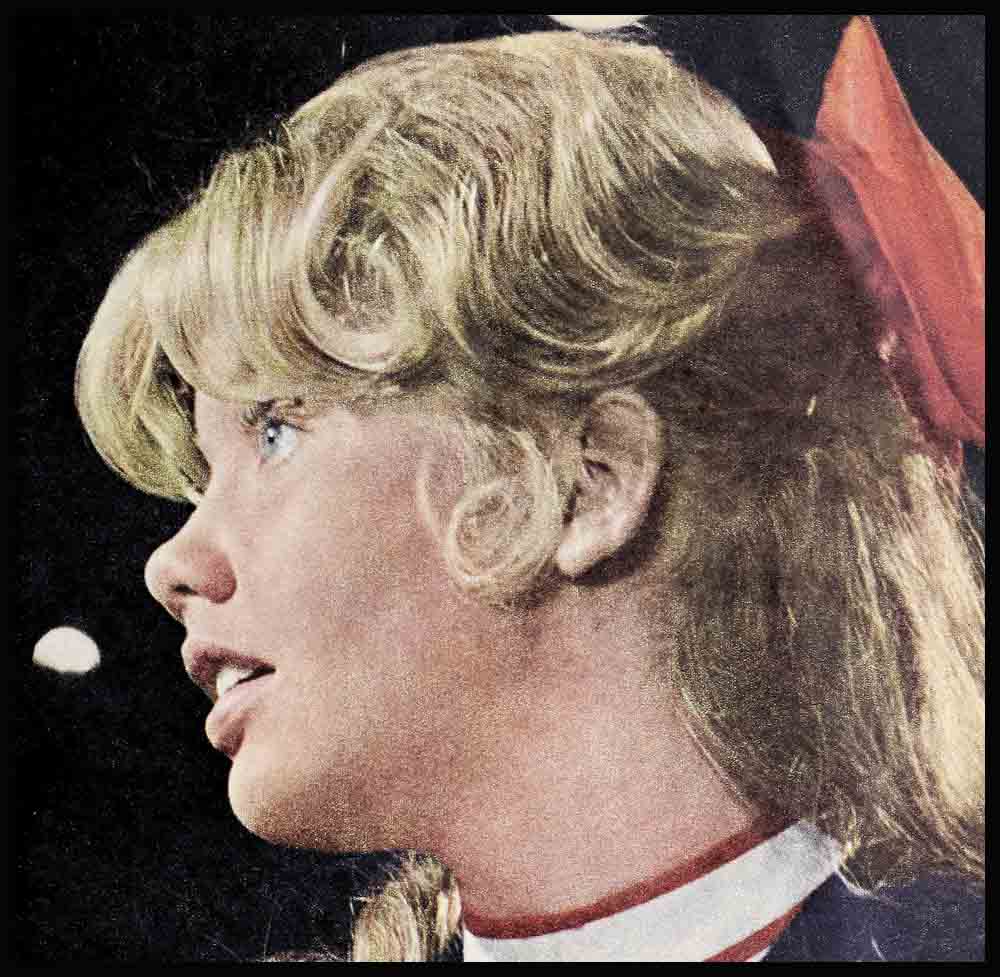
Little Girl, We Like You!
Not long ago, during a Hollywood interview with that most delightful sixteen-year-old girl of them all—Hayley Mills—she said, “Oh, I do wish you could see our home in England. And meet some of the wonderful people who work our farm. And meet Kay Forward, our secretary (her picture’s at left) who’s been with us for more than twelve years now. Ho, I bet she could tell you a lot about. me!” We mentioned to Hayley that, in fact, we were planning a trip to England in just a few weeks’ time. “Super,” she said. “Then why don’t you pop in on Katie? No American writers have been to our farm, ever, as far as I know. Most interviews are done at our Hat on Wilton Row, in London. But just tell Katie that you’re from PHOTOPLAY, that Hayley sent you. And tell her to be quite frank in talking about me. I know it doesn’t sit well with Katie when she reads only the goody-goo articles they print sometimes. It certainly sits awkwardly with me. So tell Katie I said no-holds-barred, just the truth. . . ”
“No-holds barred, hmmmmm?” smiled Kay For- ward, a tall and charming woman, the day we popped in on her. “Well . . . let’s start with the worst about Hayley . . . and then proceed to the to the better . . . and best.” She’d just finished pouring the tea which the Mills’ maid, Mrs. Hicks, had brought into the farmhouse parlor, where we sat talking. “Hayley’s faults,” she said gently, “be- gin with her feet. She’s most extravagant about shoes, you see. She’ll often say to me out of the clear blue, ‘Do come to buy shoes with me, Katie.’ ‘Another pair?’ I’ll ask, ‘—but Hayley, you already have several blacks and a white and blue and even a green.’ ‘It’s just,’ Hayley will say then, ‘that I feel particularly keen on a pair of reds, all of a sudden.’ Then she’ll add, ‘Do you think we can go on Mummy’s account?’ And she’s also very forgetful, our Hayley is. She’s always leaving things behind. Always. Vital things. Her script, for instance —more than once I’ve had to rush that to the studio. And her purse, with money in it. Even when she went off to school in Switzerland last year—to this school in Rougemont, high in the Alps—she went without her warm sweaters and even with- out some of her lesson books. The sweaters, in time, Hayley wrote for. But the books— well, there was jolly little mention of them in her first letters.
“She’s rather untidy at times, too. You think to yourself—and sometimes aloud— ‘How can one girl leave so many things scattered about?’ Her head, it seems, is always way up there in the clouds. She’ll be sitting somewhere, looking out the window, humming—for hours. And then suddenly you’ll hear her cry out, ‘Oh Lord, I forgot to do this’—or, I’ve got to be at an interview.’ And off she’ll run.
“She’s not very punctual, except on the set, when she’s filming. And speaking of filming, you can often sit around of an evening and see Hayley sitting right here with you, listening to music perhaps and you wonder, ‘When in the world is she going to memorize her lines for tomorrow?’ But she does. Somehow. Before going off to bed she takes a peek at her dialogue. And she must have the most amazing sort of photographic memory, because the next day at the studio she’ll know every word and line letter-perfect. She shares this particular quality with her sister, who has the same uncanny knack.
“Is Hayley similar in temperament to Juliet?
“Oh no. Not at all. Hayley admires her sister terrifically. When they were small it was a beautiful thing to see them together—the way Juliet mothered Hayley, the way Hayley simply worshiped her sister.
“But there is quite a difference in personality between them. Juliet is more serious, I’d say, while Hayley is more volatile. Juliet told me soon after her wedding last October that when she’s working in a film she plans her menus for the week. Now I can’t imagine Hayley doing that—ever. Also, Juliet has only a few friends, but very close friends. While Hayley has loads of them, but not close ones. I remember well how when she first went to Elmhurst, a school Hayley attended, she had a different close friend every day. There would be mad letters written and secrets shared with one girl on a Monday, then the same thing on Tuesday and Wednesday and so forth —but always with different girls. It was very hard to keep up with these best- friendships for a while.
“Juliet has always been fantastically dedicated to acting. Hayley, well, the whole thing seems to be a sort of delightful part of her life—something she fell into quite by accident.
“Hayley’s reaction to becoming an actress was quite amusing to me, by the way. She was twelve at the time. She’d never, never expressed any real interest in acting before this, though I had seen her in several school plays at Elmhurst and then at the Vicarage.
She was always a superb little mimic—like her father. He foxes me, all right. He phones me sometimes and pretends to be a butler, or a foreigner. At any rate, Lee Thompson, the director, was here at the house one day telling Mr. Mills about a script called ‘Tiger Bay’—about a detective who tracked down a Polish sea- man wanted for murder and a little boy, a friend of the seaman. He was in the middle of explaining the plot, I remember, when he saw Hayley, her hair cropped, dressed in jeans and a gray sweater, playing outside in the garden. He stared out at her, and finally he said, ‘By jove, the script doesn’t call for a little boy at all. but a little girl. That girl!’
“When Mr. and Mrs. Mills told Hayley about Mr. Thompson’s suggestion, they were naturally quite serious about it. After all, a child with no acting experience might easily become unnerved by such a thought. But Hayley simply grinned a very large grin and she said to them, ‘Me? An actress? Oh, I think that would be just mmmmmmmarvelous!!’ . . . And she did really feel that way, in that happy-go-lucky way of hers. A few days later, I remember, a more formal meeting between Hayley and Mr. Thompson was arranged, at a very special luncheon at the Ritz. Well, the car pulled up across the Street from the hotel. Hayley and the rest of us got out and began to cross the Street. Suddenly, Hayley began to walk in this strange new posture and her mother said to her, ‘What is it with this bent-knee department?’ Whereupon Hayley answered, ‘It’s just in case Mr. Thompson might think I’ve grown too tall for the role these past few days!’ She was in earnest, too.
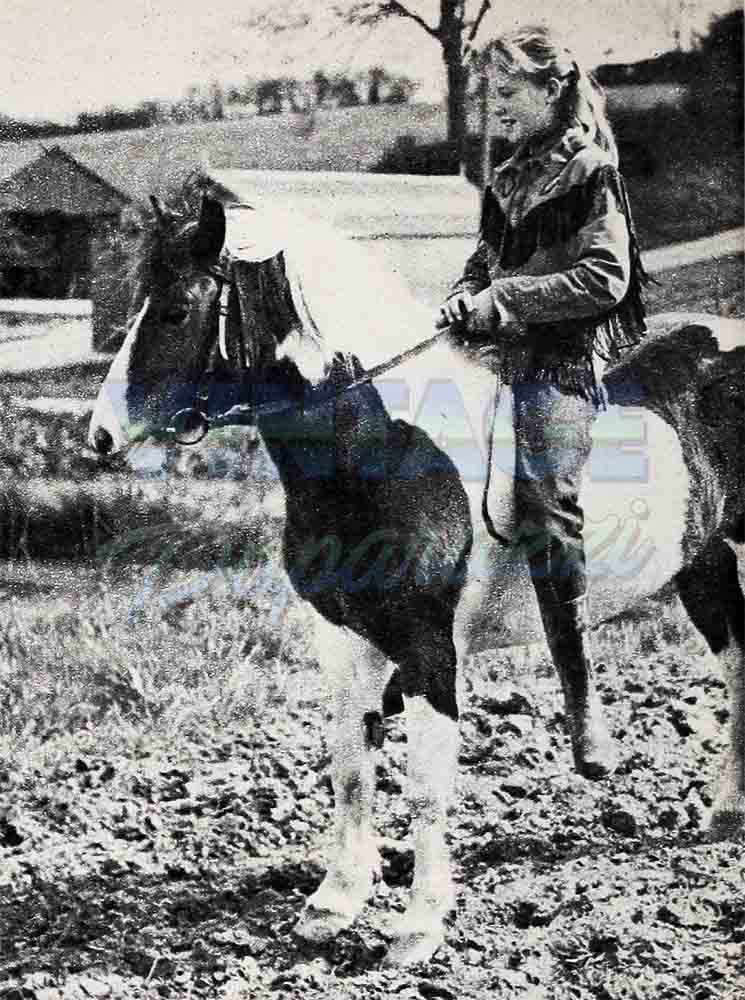
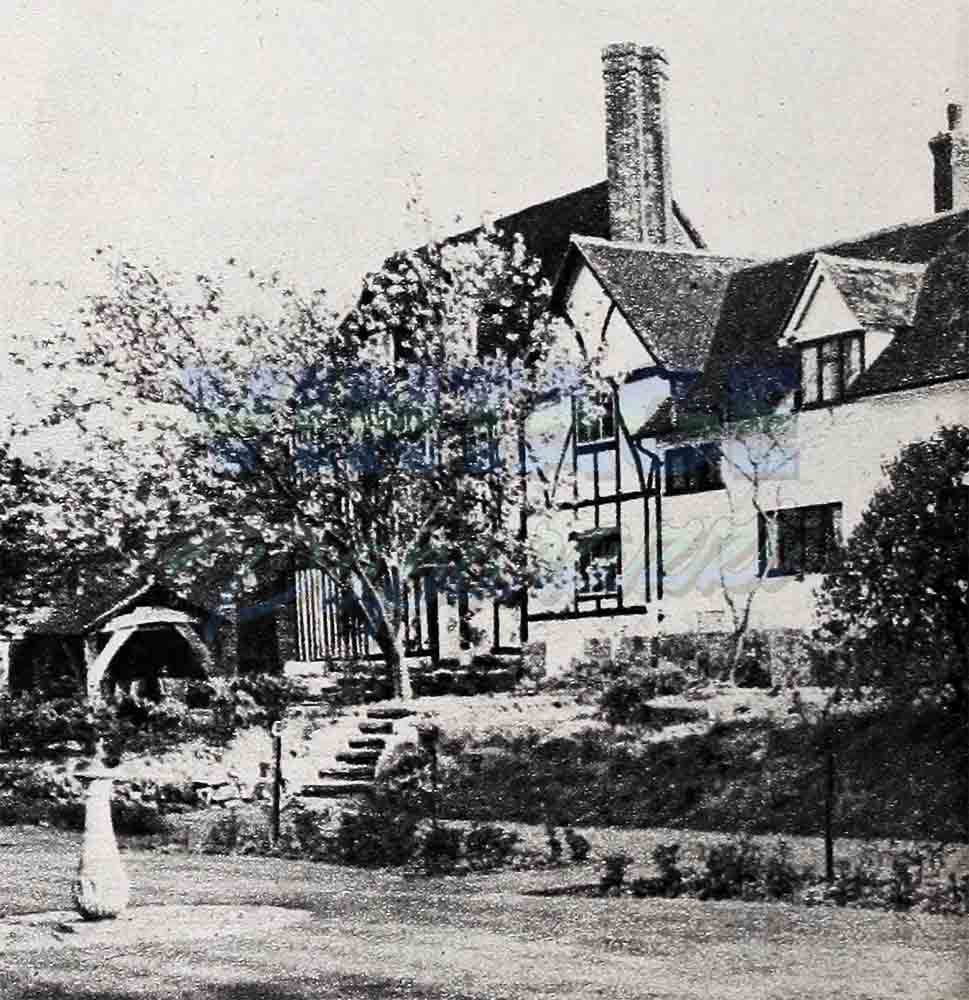
“I first met Hayley when she was not tall at all, only three years old. That was back in 1948. I’d worked for a while in the public relations department of Associated British Cinema. Then I’d married, had a child and semi-retired for a bit. And finally one day, looking for work again, I was told that Mr. John Mills, the actor, and his wife Mary, the novelist, were seeking a private secretary. So I was interviewed by them, they took me on right away. Immediately, of course, I got to know the entire family, including Hayley.
“The first thing I remember about her?
“Without any doubt, it was her love for animals—a love she still is blessed with. I Of course it’s Annabelle who is Hayley’s favorite—the pony you might have seen grazing in the west field. The brown-and- white beauty. She’s rather small for Hayley now. Hayley got her when she was ten. But at the beginning Annabelle would follow Hayley about like a dog. Hayley, for instance, would be in the dining room, eating, and in would scraggle Annabelle, sliding on the old stone floor—this was before the new rugs were laid—sliding, and falling, and then getting up with that quiet dignity of hers and continuing on to where Hayley sat, for a pat on the nose or, better, a lump from the sugar bowl. It was the most charming relationship be- tween child and animal that I have ever seen. Though even before Annabelle’s arrival, I was impressed with the fantastic relationship she had with all animals.
“With her two dogs, for instance; Suky and Hamlet—alas poor Hamlet, he’s gone now. And with birds. I remember one Christmas I asked Hayley what she wanted h most as a present. And she said to me, ‘Wings, Katie, that’s what I’d really like. So I can fly with my little friends when they come back to England this springtime and go swooshing above the river with them and under the bridges. I’d especially love that, to go swooshing under the bridges with them.’
“And her love for insects. The first time I saw Hayley, in fact, she was suffering from a most awful Caterpillar rash because those were the friends she’d been a playing with that morning—a big mound i of caterpillars. She was mad about bees, too. ‘To think,’ she’d say, ‘that they are best friends with flowers. Isn’t that a wonderful way of life?’ Caterpillars. Bees. And even flies she loved. There were times you’d see her sitting in the garden, staring into the palm of her hand, and you’d ask, ‘What’ve you got there, Hayley?’ And without looking up she’d say, ‘A poor little fly. See him? I found him floating in the pool a little while ago with his wing broken. Well,’ and she’d sigh, I’m going to take him into the house now and see that the wing gets mended.’ And a few days later you would hear Hayley clapping her little hands together and shouting, ‘You’re better, dear fly. You’re all better, sir. Now you can go home to join your wife and your children. Goodbye. Goodbye. And please be more careful from now on, and please stay well!’
“My other memories of Hayley as a little girl?
“Well, she was very keen on painting when she was small. She still paints sometimes and she’s done some very nice things. Juliet, in fact, has one of Hayley’s landscapes hanging in her new house.
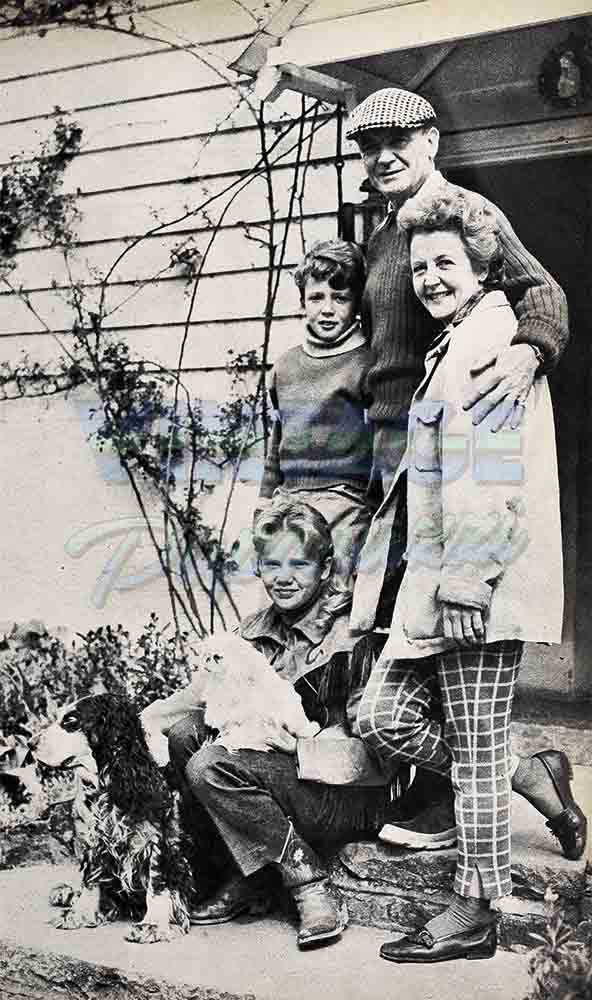

“And she was very keen on writing. Plays. Most of them were localed in this very house. The house, you see, is actually over six hundred years old. And of course it has its traditional English ghost. And it actually has in the very next room, beneath that rug, a cave with trapdoor where the family now keeps the deep-freeze but where, in the time of Henry the Eighth, the Catholic monks in the area would hide when the Protestant armies passed through these parts. And such are the things Hayley would write about in her little plays and read them aloud to us.
“Hayley is today the same unspoiled girl she has always been. And this I admire terribly about her. And for this I give a great deal of credit to Mr. and Mrs. Mills.
“They have always been very firm with the children, you know. If they decide something, they stick by it. If Mrs. Mills, for instance, says to Hayley, ‘You won’t do it’—then that’s it. Hayley won’t argue. She might mutter, ‘What a pity,’ but there’s never any fuss. I remember the time Hayley was due for a hairdresser’s appointment in London. Normally she does her own hair. She has to pay a lot of attention to it, you see—it’s so long and fine—and she sets and washes it once a week herself. But this one time, on a treat, she went for this fantastic hairstyle—Birdsnest, I think they call it. And when Mrs. Mills saw this she said, ‘Oh no, you’re going to come to my hairdresser!’ And so Hayley went. And she came back looking just lovely. And there was no fuss at all. None at all.
“Also, Mr. and Mrs. Mills never let Hayley go off by herself for any length of time. Just recently, before this last trip to the States, someone said to the Mills’, ‘But Hayley’s sixteen now. Certainly she can go off to Hollywood without you. Certainly you can arrange for someone there to watch out for her.’ And the Mills’ response was that Hayley must have a home influence, that she must lead a home life —even when she’s away from home—and yes, of course, they went along with her. Mr. Mills took time off between stage and film commitments; Mrs. Mills between novels. And they’re all together in California right now and having a jolly time.
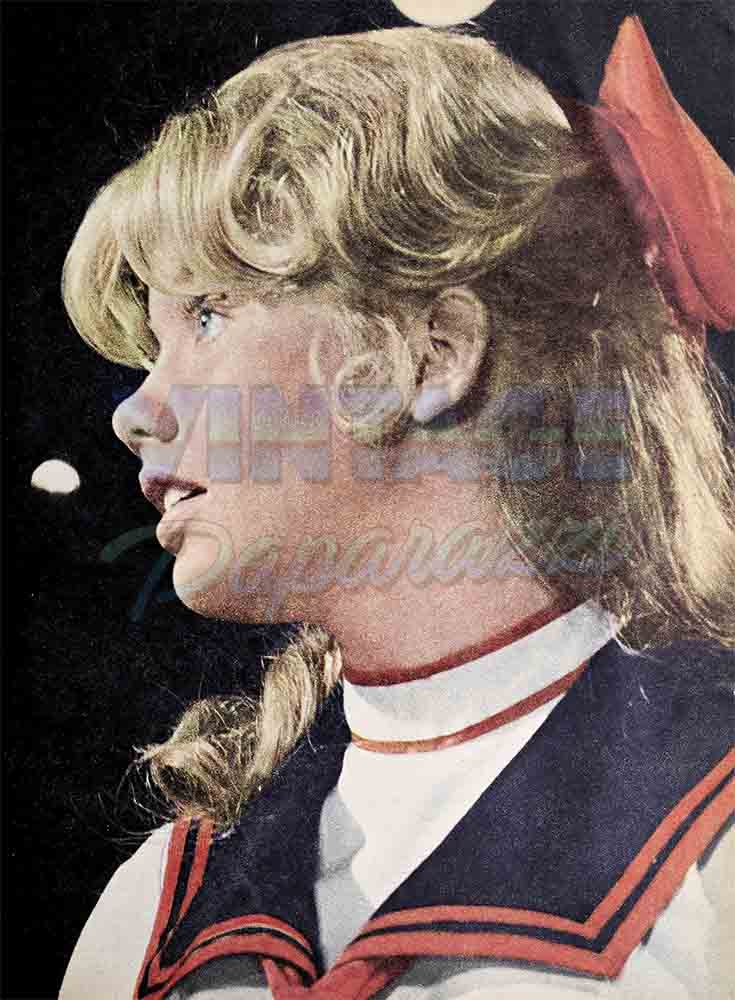
“Hayley, I might add, has been very appreciative of this firmness on her parents’ part. That is, inside her, she seems to realize that what they do for her is right for her. Certainly she couldn’t be a better daughter. Her every thought is for her family. She’s most embarrassed when the compliments and flattery are directed at her alone. You know exactly what she’s thinking at times like this: ‘And my father is a great actor, my mother is a wonderful writer, my sister Juliet is a superb actress and my brother Jonathan is a perfect little brother. So if you applaud for one of us, please, you must applaud for us all!’ It’s so nice to see Hayley and all the family together. It’s so nice to see her with her father sometimes. He loves to walk. To see how his cattle are coming along—the Guernseys and the Angus. Or to see how the workers are doing with the milking and the haying. Or just for the sake of walking sometimes. And he loves it especially when Hayley walks with him. And there are times when he asks her to come along and you just know that Hayley’s a bit tired perhaps, or that she’d rather be down in the new games-room playing her piano while Jonathan plays his drums, or listening to the gramophone—she’s absolutely mad on her rock-and-roll records. But she’ll never let on when Mr. Mills asks, ‘A walk, Hayley?’ Instead, she’ll say, ‘Oh yes, Daddy, that would be fine.’ And off they go, father and daughter—a big smile on his face, a big smile on hers.
“Does Hayley have any boy friends? Ah yes, I knew you would get around to asking me that. Well, it seems to me that she’s not really that terribly interested in boys yet. When she goes out, she likes to know that she’s got a nice partner. She loves going to the cinema once in a while with a friendly young man. And to an occasional party with people her age. She is popular, though. I read only the other day that in Hollywood she’s had a date or two recently with Frank Sinatra, Jr. And with a few others. But Hayley’s most enthusiastic letter to me from Hollywood was about Eddie Hodges—a co-star of hers in ‘Summer Magic.’ ‘He was such jolly good fun,’ she wrote—and it was only later I learned that Eddie Hodges is even a few years younger than Hayley.
“Is there anything about Hayley that worries me?
“Well, let me think for a moment. Yes. There is one thing. Her success, her great success of that past few years, seems to have made her a trifle shy at times. She misses, I think, an anonymity she once enjoyed. She hates being noticed in shops now. She would so like to be able to walk into a shop and get what she wants without fuss. She rather dreads it when a mob of people notice her at once and begin screaming her name.
“All this sort of adulation rather gets her down at times. But, in time, I know that Hayley will learn to cope with this as she has with other problems. I have no other worries for her.
“She is such a fine girl, our Hayley—she gives quite well of herself and the world seems to give her quite well in return.”
—MICHAEL JOYA
See Hayley Mills in “In Search of the Castaways.” Her next picture will be “Summer Magic.” Both for Buena Vista.
It is a quote. PHOTOPLAY MAGAZINE MARCH 1963




